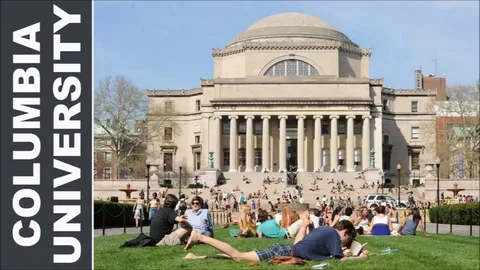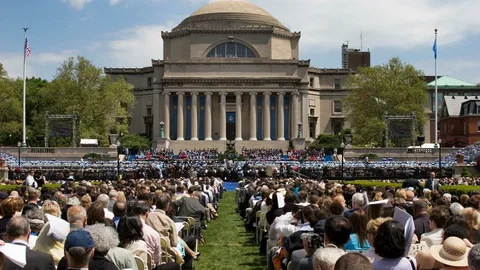Columbia College, situated in the core of New York City, remains as one of the most esteemed foundations of advanced education on the planet. Laid out in 1754, it has a rich history that mirrors the development of American schooling and society. This blog will dig into the different parts of Columbia College, including its set of experiences, scholarly projects, grounds life, striking graduated class, and its effect on society. Columbia University

History of Columbia University
Origins: The Founding Years
Columbia College was initially established as Ruler’s School in 1754 under an illustrious contract from Lord George II of Extraordinary England. The school was meant to give training that underscored the human sciences and sciences. Classes were at first held in a vestry room at Trinity Church in Manhattan, with only eight understudies and one employee, Dr. Samuel Johnson.
Transition to Columbia College Columbia University
After the American Upset, Lord’s School was renamed Columbia School in 1784. This change represented a shift towards a more American character. The school’s recovery was upheld by conspicuous figures, such as Alexander Hamilton and John Jay, who assumed urgent roles in its administration.
Growth and Development Columbia University
In 1896, Columbia School was renamed Columbia College in the City of New York. The college extended fundamentally during this period, moving to its ongoing Morningside Levels grounds in 1897. Under the initiative of Nicholas Murray Steward, who filled in as president for north of forty years, Columbia turned into a main establishment for exploration and grants.
Key Historical Milestones
- 1912: Columbia College formally took on its ongoing name.
- 1930s: The college turned into a center point for notable exploration and scholarly talk.
- 1983: Columbia School started conceding ladies, reflecting more extensive cultural changes with respect to orientation uniformity in training.
Academic Programs Columbia University
Undergraduate Schools
Columbia College involves a few undergrad schools:
- Columbia School: The human sciences school that offers a wide scope of disciplines.
- School of Designing and Applied Science: Zeroed in on designing and applied sciences.
- School of General Investigations: Intended for modern understudies looking for human sciences instruction.
Graduate Schools Columbia University
Columbia is home to various alumni programs famous for their scholastic thoroughness:
- Columbia Graduate School: Reliably positioned among the top graduate schools in the U.S.
- Columbia Business College: Known for its inventive educational program serious areas of strength for and network.
- School of Doctors and Specialists: A main clinical school that underlines research and clinical practice.
Core Curriculum
One of Columbia’s characterizing highlights is its Central subjects, laid out in 1919. This program requires all students to draw in essential messages and thoughts across different disciplines, cultivating decisive reasoning and scholarly commitment.
Campus Life Columbia University
Location and Facilities
Moreover, Columbia’s grounds are arranged in Morningside Levels, encompassed by social foundations like the American Historical Center of Regular History and Focal Park. Then the grounds highlight notable structures like the Low Dedication Library and Head servant Library, which house broad assortments.
Student Organizations
Moreover, with north of 500 understudy associations, Columbia offers an energetic ground life. Then these associations range from scholastic clubs to social gatherings, giving understudies chances to connect socially and scholastically.
Athletics
Moreover, Columbia is an individual from the Elite level and has a rich athletic custom. The college offers different game groups that contend at undeniable levels while accentuating understudy competitor prosperity.
Notable Alumni Columbia University
Columbia has delivered various powerful figures across different fields:
- Barack Obama: 44th Leader of the US and Nobel Harmony Prize laureate.
- Ruth Bader Ginsburg: Moreover previous High Court Equity known for her backing for orientation balance.
- Alexander Hamilton: Principal architect of then the US and first Secretary of the Depository.
Impact on Society
Research Contributions
Moreover, Columbia College has been at the forefront of huge exploration drives. Moreover, its employees have made pivotal commitments in the fields like medication, science, sociologies, and humanities.
Social Justice Initiatives
The college effectively participates in civil rights drives through different projects pointed toward tending to disparity and advancing variety nearby and then some.
Global Outreach Columbia University
Columbia’s obligation to worldwide schooling is clear through then global projects urge understudies to draw in with worldwide issues. Then the college has researchers from around the world and encourages diverse trade.

Challenges Facing Columbia University
Financial Accessibility
As educational cost costs rise, monetary openness remains a major problem for then majority of imminent understudies. Columbia is attempting to then improve monetary guide contributions to guarantee that skilled understudies from all foundations can join in.
Campus Diversity
While progress has been made in regard to variety, there are continuous endeavors to establish a more comprehensive climate for all understudies. Then the college keeps on executing drives pointed toward expanding portrayal among staff and understudies.
Conclusion
Columbia College remains a signal of scholastic greatness and development. Moreover, with its rich history, different scholarly projects, energetic grounds for life, and obligation to social obligation, it keeps on forming future pioneers across different fields. Moreover, as we look forward to the future, Columbia stays devoted to cultivating a climate where information flourishes and cultural difficulties are tended to head-on.
This complete outline gives bits of knowledge into different parts of Columbia College while featuring its importance inside American training and society. From verifiable achievements to contemporary difficulties, understanding these components values why Columbia then remains one of the main foundations all around the world. Columbia University
Citations:
https://en.wikipedia.org/wiki/Columbia_University
https://www.college.columbia.edu/about/history
https://en.wikipedia.org/wiki/History_of_Columbia_University
https://www.britannica.com/topic/Columbia-University
https://history.columbia.edu/department/
https://en.wikipedia.org/wiki/History_of_the_National_Football_League
https://en.wikipedia.org/wiki/National_Football_League
https://www.espn.com/nfl/story/_/id/27321898/how-nfl-took-america-100-years